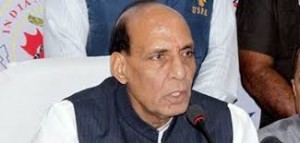 NEW DELHI: Accusing erstwhile UPA government of hatching a “deep conspiracy” to frame Narendra Modi when he was the Gujarat Chief Minister, Home Minister Rajnath Singh today alleged that the previous regime had done a ‘flip-flop’ on the links of Ishrat Jahan with terror outfit LeT.
NEW DELHI: Accusing erstwhile UPA government of hatching a “deep conspiracy” to frame Narendra Modi when he was the Gujarat Chief Minister, Home Minister Rajnath Singh today alleged that the previous regime had done a ‘flip-flop’ on the links of Ishrat Jahan with terror outfit LeT.
Without naming P Chidambaram, he charged the then Home Minister with giving “color” to terrorism by coining the term ‘saffron terror’.
Responding to a calling attention motion on “alleged alteration of affidavit relating to Ishrat Jahan case” in the Lok Sabha, the Home Minister said “unfortunately, I have to say this that there was a flip-flop by UPA government in the Ishrat Jahan case.”
Amid protests and slogan shouting by Congress members who had trooped into the Well of the House, Singh charged Chidambaram of coining the term “saffron terror” and “Hindu terror”.
“Color, creed and religion should not be associated with terrorism. Terror has no color… The seculars gave color to terrorism. Selective secularism cannot be accepted by the country,” Singh said.
He said the recent statement made by Pakistani-American terrorist David Headley before a Mumbai court only reaffirmed the first affidavit filed by the UPA government on August 6, 2009 before the Gujarat High Court that Ishrat had links with LeT.
“It (Headley’s statement) was the second clear indication that she was a terrorist,” he said.
The minister said the second affidavit filed by the government before the High Court on September 29, 2009 “weakened” the fact that she was a LeT operative.
He said the effort seemed to be to “defame the then Gujarat Chief Minister (Narendra Modi), state government, some leaders and those associated with the case. There was a deep conspiracy to frame them,” he said.
The Home Minister said a few key documents including two letters written by the then Home Secretary (G K Pillai) to then Attorney General late G E Vahanvati and the copy of the draft affidavit have so far been untraceable.
He said the missing documents include the copy of the affidavit vetted by the AG and the draft of the second affidavit vetted by the AG on which changes were made.
“We have ordered an internal enquiry in the Home Ministry in this regard and necessary action will be taken accordingly,” he said.
In his written response to the Calling Attention Motion, Singh said the notings on the concerned file do not provide any reason for filing of the second affidavit.
“It has been mentioned in the affidavit that the further affidavit was being made in view of subsequent developments in relation to the issues connected with the petition and to clarify apprehensions expressed in regard to the (first) affidavit filed by Union of India as well as to refute attempts to misinterpret portions of the affidavit.”
He said the second affidavit stated that all intelligence inputs “do not constitute conclusive proof” and it is for the state government and the state police to act on such inputs.
“It was further submitted that the central government is in no way concerned with such action nor does it condone or endorse any unjustified or excessive action.
“It was also mentioned that the main purpose of the first affidavit was to highlight the contradiction in the pleadings averred in the petition filed by Shamima Kausar (Ishrat’s mother) and the petition which had been filed by M R Gopinath Pillai (Javed Sheikh alias Pranesh Pillai’s father),” read the statement.
Ishrat was killed in an alleged fake encounter in Gujarat in 2004.
The first affidavit was filed on the basis of inputs from Maharashtra and Gujarat Police besides the Intelligence Bureau where it was said that the 19-year-old girl from Mumbai outskirts was a Lashkar-e-Taiba activist but it was ignored in the second affidavit, Home Ministry officials said.
The second affidavit, claimed to have been drafted by Chidambaram, said there was no conclusive evidence to prove that Ishrat was a terrorist, officials said.
Former Union Home Secretary G K Pillai had claimed that as Home Minister, Chidambaram had recalled the file a month after the original affidavit, which described Ishrat and her slain aides as LeT operatives, was filed in the court.
Ishrat, Javed Shaikh alias Pranesh Pillai, Amjadali Akbarali Rana and Zeeshan Johar were killed in an encounter with Gujarat Police on the outskirts of Ahmedabad on June 15, 2004.
The city crime branch had then said those killed in the encounters were LeT terrorists and had landed in Gujarat to kill then Chief Minister Narendra Modi.–PTI






